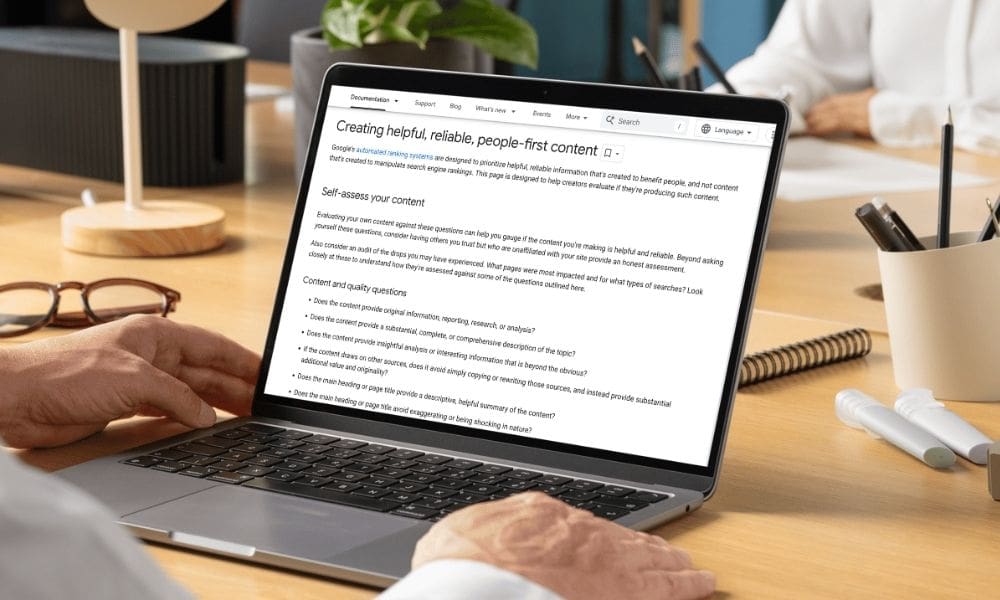Why Google’s Helpful Content Update Changed Everything About Blogging




The evolution of blogging has always been shaped by Google’s search algorithm updates, each carrying the potential to redefine how content is planned, written, optimised, and ultimately ranked in search results.
The 2025 Google Algorithm Update, which introduces the Helpful Content Update, represents one of the most significant shifts in recent years. Unlike earlier updates that largely concentrated on technical SEO elements or link-building practices, this change places its emphasis firmly on creating content that is genuinely useful, informative, and written with a people-first approach. For bloggers, marketers, and businesses that rely on search visibility, understanding how this update reshapes content strategy is critical.
In the article below, we explore the implications of the Helpful Content Update and what it means for businesses and marketers alike, aiming to succeed in SEO through high-quality blogging.

The Google helpful content update is designed to ensure that content ranking on search engines is genuinely useful to users rather than created primarily to attract traffic. While Google has always emphasised the importance of quality content, this update goes a step further by introducing a system that evaluates content based on its value to real readers.
In practical terms, the update penalises content that:
Conversely, content that demonstrates clear utility, addresses user needs, and reflects real-world knowledge is rewarded with higher visibility in search results.
For anyone focused on blogging for SEO, this update represents a major shift. Previously, it was possible to achieve strong search rankings with content that was well-optimised for keywords, even if it lacked depth or originality. Now, Google explicitly prioritises content that is helpful first, and optimised second.
This change impacts multiple aspects of content strategy:
One of the most important lessons of the content update 2025 is that blogs need to focus on their audience rather than search engines.
You can embrace this by conducting thorough research to understand common questions and challenges in your niche, writing in-depth guides that answer those questions comprehensively, and using clear, accessible language that aligns with your audience’s level of knowledge.
The update discourages the production of large volumes of low-value content, signalling a significant shift in how content is evaluated for search rankings. In the past, publishing frequently could help maintain visibility, even if each blog post or article provided minimal value to readers. However, search engines now prioritise content that is genuinely helpful, informative, and authoritative, meaning that quantity alone is no longer sufficient.
To adapt, content writing strategies must place quality above sheer output. This involves prioritising detailed guides, tutorials, and comprehensive resources that thoroughly address the questions and challenges faced by the target audience. Updating existing content is equally important, as improving accuracy, depth, and relevance ensures that information remains trustworthy and useful over time.
However, outdated, thin, or redundant content should be removed, as it can dilute the overall value of a website and negatively affect rankings. Writers should also focus on aligning content with user intent, ensuring that each piece not only answers questions but does so in a clear, accessible, and engaging manner.
By concentrating on creating fewer, higher-quality resources, businesses can build lasting authority, improve user satisfaction, and maintain sustainable search visibility in an environment that increasingly rewards helpfulness and expertise.
While blogging for SEO still requires keyword research and optimisation, the emphasis is now on naturally incorporating keywords within genuinely valuable content. Keyword stuffing or creating content solely around high-traffic phrases can trigger the algorithm to downgrade a page.
Writers should focus on topic clusters rather than single keywords, ensure keywords fit naturally within helpful, informative content, and use semantic variations to cover the breadth of a topic without repetition.
The update discourages the production of large volumes of low-value content, but in the past, publishing frequently could help maintain rankings, even if each blog wasn’t beneficial.
As a result, content writing strategies should now focus on quality over quantity, prioritising detailed guides, tutorials, and comprehensive resources. This involves updating existing content to improve accuracy and depth, and eliminating outdated or thin content that no longer serves readers, ensuring every piece provides genuine value to the audience.
To thrive after the Google algorithm update 2025, businesses and content creators must rethink how they approach blogging. Here are key strategies:
Audit Existing Content: Identify posts that are outdated, shallow, or written primarily for search engines. Refresh them to provide more value, remove fluff, and incorporate practical advice.
Focus on Long-Form, In-Depth Articles: Research shows that comprehensive content that thoroughly answers user queries tends to perform better under this update. Aim for posts that explore topics from multiple angles, using examples, visuals, and actionable insights.
Showcase Expertise: Introduce author bios, credentials, and personal experiences that lend credibility to your content. For technical or professional niches, demonstrating expertise is critical to ranking.
Prioritise Readability and Engagement: Use clear headings, subheadings, and concise paragraphs. Incorporate visuals, infographics, and bullet points where necessary to enhance user experience.
Monitor Performance and Feedback: Track engagement metrics such as dwell time, bounce rates, and social shares. Content that genuinely helps readers will naturally see better engagement, aligning with Google’s updated evaluation.
Google is increasingly focusing on human-centric evaluation, and the content update for 2025 reflects this broader trend in search. The algorithm is no longer tolerant of keyword-heavy pages or superficial articles that offer little substance; instead, it prioritises blogs that provide genuine educational value, deliver clear and accurate information, and address real-world problems faced by readers.
For marketers and businesses, this is both a challenge and an opportunity. If you’re willing to invest in genuinely useful content, you will benefit from stronger rankings, better user engagement, and long-term SEO success, however, those who continue to rely on outdated tactics may find their visibility and traffic declining.
The Google helpful content update has fundamentally reshaped the landscape of blogging and changed the way blogs are written. While SEO remains important, the primary focus must now be on creating content that is genuinely helpful, insightful, and user-focused. By adapting strategies to emphasise quality, expertise, and reader value, bloggers and businesses can thrive in the post-update environment with better rankings, stronger credibility, and a more engaged audience.
Looking for help with SEO optimised content? Our SEO consultancy team at Clever Clicks Digital is on hand, ready to support you.

Discover why LinkedIn is a vital platform for service-based businesses, and learn how to leverage it to generate leads, build authority, and grow your professional network.
Read full blog
Explore the latest data on video advertising and find out whether investing in video ads can drive results and deliver a strong return on investment.
Read full blog